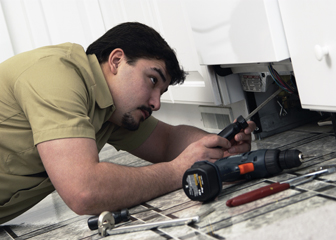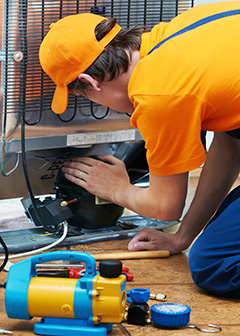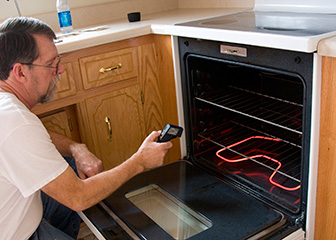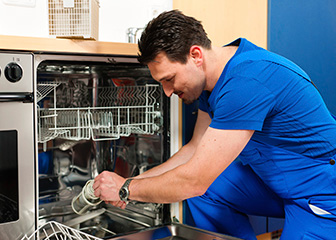How to Become a Home Appliance Repairer About this section

Home appliance repairers need to stay up-to-date with new appliance technology.
Most home appliance repair technicians are trained on the job. A growing number of employers, however, prefer to hire workers who have completed technical or vocational training.
Education and Training
Most home appliance repairers learn their skills on the job by working with experienced technicians. Some companies and appliance manufacturers provide further training through seminars, demonstrations, or coursework.
Introductory training in basic electricity or electronics may last several months to a few years, depending on the employer or specialty. Manufacturers also may require technicians to receive training to become authorized for warranty work.
Although on-the-job training is the most common method of training, employers generally prefer to hire workers who have attended high school or, increasingly, postsecondary vocational or technical programs in electronics or appliance repair. These programs can help reduce the amount of on-the-job training for entry-level workers.
Nearly all technicians must take continuing education courses to sharpen their skills and to be able to repair the newest appliance models.
Licenses
The U.S. Environmental Protection Agency (EPA) requires all technicians who buy or work with refrigerants to be licensed in the proper handling of refrigerants. Although formal test preparation is not required, many trade schools, unions, and employer associations offer training programs designed for the EPA exam.
A driver’s license and a clean driving record also may be required because some home appliance repairers must drive to customers’ homes to service their appliances.
Certification
Home appliance repairers may show their competence by earning voluntary certification. For example, they may get the National Appliance Service Technician Certification (NASTeC) from the International Society of Certified Electronics Technicians by passing an exam that tests their skills in diagnosing, repairing, and maintaining home appliances.
The Professional Service Association (PSA) offers a similar certification program based on skill competencies that the industry developed and updates annually. By passing the PSA exam, home appliance repairers can use the title Master Certified Appliance Professional (MCAP).
These certifications can be helpful when looking for employment, and some employers actively seek out certified home appliance repairers.
Important Qualities
Bookkeeping skills. Home appliance repairers must be able to keep accurate records of hours worked, parts used, and bills collected. This is especially true for self-employed technicians.
Communication skills. Home appliance repairers need to explain complicated mechanical processes to people who have little or no technical knowledge.
Customer-service skills. Most home appliance repairers work in customers’ homes, so it is important that they are friendly and polite.
Dexterity. Home appliance repairers need a steady hand and good hand-eye coordination for many of their tasks, such as repairing small devices, connecting or attaching components, and using handtools.
Technical skills. Home appliance repairers use sophisticated diagnostic equipment when working on complex appliances. They must be familiar with both appliances’ internal parts and the appropriate tools needed to install or fix them.
Troubleshooting skills. As appliances become more intricate, malfunctions become more difficult to identify. Home appliance repairers must be able to find and solve problems that may not be immediately apparent.








